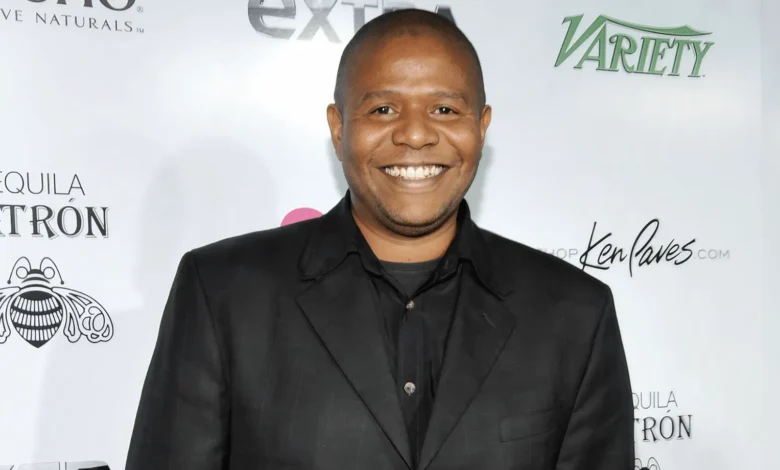Kenn Whitaker: The Untold Story of Hollywood’s Most Misunderstood Actor

Introduction
Kenn Whitaker may not be a household name like his brother Forest Whitaker, but his presence in Hollywood, though brief, left a lasting impression on film enthusiasts. Often overshadowed by the Oscar-winning success of his brother, Kenn carved his own path in the entertainment industry during the late 1990s. With only a handful of appearances, his enigmatic career has sparked curiosity, online speculation, and a wave of viral content, especially in the era of memes.
In recent years, Kenn Whitaker has resurfaced in public conversation—not through new movie roles but due to the surprising discovery of his resemblance to his brother. This visual similarity has intrigued fans and sparked debates across the internet. However, there is far more to Kenn Whitaker than memes and mistaken identity.
This article takes a closer look at Kenn’s life, career, and the quiet legacy he left behind. From his humble beginnings and film roles to his deliberate decision to step out of the limelight, we’ll explore who Kenn Whitaker really is and why he remains such a fascinating figure in pop culture today.
Who Is Kenn Whitaker? A Brief Biography
Kenneth Dwayne Whitaker, professionally known as Kenn Whitaker, was born on June 8, 1963, in Longview, Texas, USA. He grew up in a tight-knit family with three siblings, including Forest Whitaker, who would go on to become a major figure in the acting world. Raised in a working-class environment, the Whitaker family emphasized the values of hard work, education, and self-expression—values that would later influence Kenn’s career choices.
Despite growing up in the same household as a future Hollywood heavyweight, Kenn was not always inclined toward acting. His path to the film industry came later in life, and it wasn’t until the late 1990s that he made his on-screen debut. Even then, Kenn maintained a grounded and low-key approach to fame. He wasn’t driven by the same ambition to dominate the screen as others; instead, he appeared to view acting as a creative endeavor rather than a lifelong profession.
Kenn’s private nature has made it difficult for fans and media alike to uncover personal details. Unlike his brother Forest, who is known for his philanthropic efforts and advocacy work, Kenn preferred to live life away from the cameras. His decision to stay out of the limelight speaks volumes about his personality—a man more content with simplicity and authenticity than with public recognition.
Career Overview: From Screen Debut to Silent Exit
Kenn Whitaker made his acting debut in 1997 with a minor role in the action-thriller Most Wanted, starring Keenen Ivory Wayans and Jon Voight. Although his role was small, it marked the beginning of a short-lived but impactful career in Hollywood. The following year, he appeared in two more films: Bulworth, a political comedy-drama featuring Warren Beatty, and Life, a prison-themed comedy starring Eddie Murphy and Martin Lawrence.
Perhaps his most recognizable performance came in Life (1999), where Kenn played Isaac, a fellow inmate. Despite the brevity of his screen time, he stood out for his natural charisma and compelling presence. Fans often recall his expressive eyes and nuanced delivery, both of which hinted at a deeper acting talent that never had the chance to fully flourish. These roles earned him modest recognition, enough for keen-eyed moviegoers to take notice—but not enough to propel him into stardom.
After a few more TV appearances, including a role in The Theory of the Leisure Class (2001), Kenn quietly stepped away from acting altogether. There was no major announcement, farewell interview, or final performance. Instead, he vanished from the public eye, choosing a path of silence and privacy. While many speculated about his exit, most concluded that Kenn had never sought fame in the first place. His brief career was not a failed attempt at stardom but rather a short chapter in a much more private story.
Kenn Whitaker vs Forest Whitaker: Clearing the Confusion
One of the most common points of confusion surrounding Kenn Whitaker is his uncanny resemblance to his older brother, Forest Whitaker. The two share strikingly similar facial features, including their eyes, facial structure, and expressions. This resemblance has led many to believe they are twins, despite being born two years apart. For years, fans who saw Kenn in films like Life assumed it was a younger Forest Whitaker or a digitally de-aged version of him.
The confusion reached new heights in the late 2010s when a viral meme compared the two side by side. Internet users were astonished to discover that the man they believed was Forest was, in fact, Kenn. The meme sparked a massive online conversation, introducing Kenn Whitaker to a whole new generation of fans. Google searches about Kenn skyrocketed, and so did questions like “Is Kenn Whitaker Forest Whitaker’s twin?” and “Why does Forest Whitaker look different in Life?”
Interestingly, Forest Whitaker has not publicly addressed the viral comparisons, choosing instead to maintain the family’s trademark privacy. While Forest’s career has been extensively documented—with highlights including The Last King of Scotland and The Butler—Kenn’s name remained absent from Hollywood circles.
The meme phenomenon not only reintroduced Kenn to the world but also underscored how quickly the internet can breathe new life into forgotten faces. Yet, even amid newfound fame, Kenn has chosen not to step forward, reinforcing the idea that he values anonymity over attention.
Life Away from Fame: Where Is Kenn Whitaker Now?
Since stepping away from acting in the early 2000s, Kenn Whitaker has maintained an impressively low profile. He has rarely been seen in public events, film premieres, or interviews. Reports suggest that he resides in California, leading a peaceful life far removed from Hollywood’s hustle. Unlike many former actors who transition into directing or producing, Kenn hasn’t pursued any public-facing roles within the entertainment industry.
His decision to live outside of the spotlight may stem from a desire for privacy, mental peace, or simply disinterest in the trappings of fame. In a world where every celebrity move is documented and scrutinized, Kenn’s complete withdrawal is both rare and admirable. It’s a reminder that not everyone enters the film industry with the goal of lifelong fame—some do it for passion or curiosity, and then move on.
Social media has occasionally tried to locate or “spot” Kenn, but there have been no verified public appearances in recent years. Friends of the Whitaker family and unconfirmed sources claim that Kenn is doing well and enjoys a close relationship with his siblings. If anything, his silence has added to the mystique, making fans all the more curious about his life choices.
Ultimately, Kenn Whitaker’s current lifestyle highlights the power of personal agency. In an industry where many are consumed by the need for attention, Kenn’s story stands as a rare case of walking away from it all—and doing so with grace.
Legacy and Cultural Impact
Though his filmography is brief, Kenn Whitaker has left a mark on both Hollywood and pop culture. His roles may not have earned him awards or widespread acclaim, but they contributed meaningfully to the films he was a part of. More than that, his story resonates with audiences for reasons that go beyond screen time.
Kenn’s sudden reappearance through viral internet culture speaks volumes about the evolving nature of fame. In an age where a single meme can revive forgotten names, Kenn became an unexpected symbol of the digital generation’s curiosity. While many celebrities chase virality, Kenn stumbled into it by accident—and walked away unchanged. This contrast between internet fame and real-world privacy has made him something of a cult figure, admired for his authenticity and grounded nature.
His legacy also intertwines with that of his brother, Forest. The Whitaker family as a whole represents a story of talent, humility, and diverse contributions to the arts. Kenn may not have followed Forest’s path, but his decision to step back has perhaps made his legacy even more intriguing.
Today, Kenn Whitaker is remembered not only as an actor but as an enigmatic figure who challenged the traditional narrative of success in Hollywood. He reminds us that greatness doesn’t always come with awards or fame—sometimes, it comes with knowing when to exit the stage.
Conclusion
Kenn Whitaker’s journey through Hollywood is unlike that of any other actor. From his humble beginnings to his quiet exit, his career serves as a testament to the idea that not all success is measured in fame or fortune. Though his time on screen was short, he managed to leave a lasting impression on audiences and has remained relevant decades later, thanks to internet culture and his connection to a famous sibling.
What makes Kenn Whitaker’s story truly captivating is not just what he did but what he chose not to do. In an industry driven by publicity and relentless exposure, Kenn opted for anonymity. His brief but meaningful presence in film, paired with his dignified retreat, creates a narrative that’s as rare as it is admirable.
Whether you remember him from Life, discovered him through a meme, or simply admire his decision to step away, Kenn Whitaker continues to captivate audiences in his own quiet, unassuming way.
Also Read: Deja Jackson




